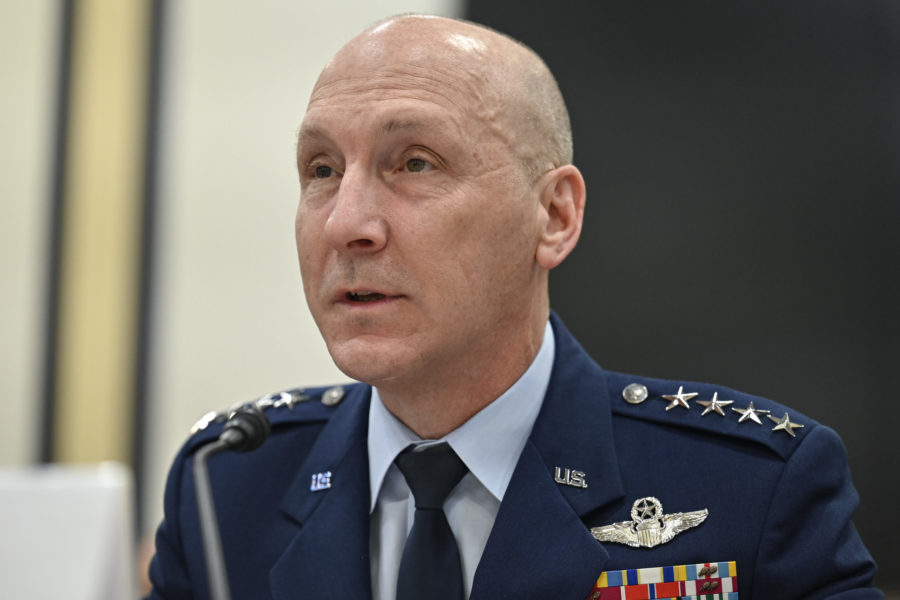President Joe Biden has nominated Gen. David W. Allvin to be the next Air Force Chief of Staff.
If confirmed, Allvin, currently Vice Chief of Staff, would succeed Gen. Charles Q. Brown Jr., whose nomination to become the next Chairman of the Joint Chiefs of Staff has cleared the Senate Armed Services Committee but still awaits confirmation by the full Senate.
Allvin has been the front-runner for the job for months. His nomination was first published in the Congressional Record, then confirmed by the White House in an announcement July 26.
“I am honored and privileged to be nominated as the next Chief of Staff of the Air Force,” Allvin said in a statement. “If confirmed, I will continue the tradition and legacy of integrity, service and excellence that this position requires. Gina and I are humbled to serve our Air Force, our Airmen and their families.”
A career mobility and test pilot with an extensive operational and staff background, Allvin maintained a low profile for most of his tenure as the vice, but began taking a more public role at the start of the year, laying the groundwork for him to become the face of the force.
Allvin, the 40th Vice Chief of Staff, would be the 10th vice chief to become Chief of Staff and the third in the past 20 years, following Gen. David Goldfein, Chief No. 21, and Gen. T. Michael Moseley, No. 18. He would be only the second Chief, and the first since Gen. Norton A. Schwartz (No. 19), to have been neither a fighter nor bomber pilot.
As an Air Staff leader, Allvin was a visionary who helped to craft the joint force operating concepts advanced by three successive chiefs: Gen. Mark Welsh, No. 20, along with Goldfein and Brown. He helped write “America’s Air Force: A Call to the Future” in 2014 and the “Air Force Future Operating Concept” in 2015, both critical precursors to what would become Goldfein’s vision for multi-domain operations and, ultimately, what is now known throughout the services as Joint All-Domain Command and Control.
More recently, he has been a leading voice tackling the service’s challenges with recruiting and retention.
“Gen. Dave Allvin is the right leader for this defining decade, as our Air Force continues to adapt to the evolving global security environment, and ensure we have the culture, concepts and capabilities needed to compete and win in a highly-contested environment,” Brown said in a statement. “His expertise in strategy and planning will be crucial to the service’s success in this era of sustained strength and deterrence.”
Assuming he is confirmed, Allvin should find many familiar faces among his fellow Joint Chiefs, joining several fellow vice chiefs who fleeted up: Army Gen. Randy George (nominated to be the next Army chief), Navy Adm. Lisa Franchetti (nominated to be the next Chief of Naval Operations), and Gen. Eric Smith (nominated to be the next Commandant of the Marine Corps). All four served on the Joint Requirements Oversight Council, and all four are expected to be confirmed as service chiefs.
However, Allvin’s and the other vice chief nominations are in limbo—along with hundreds of other general officer nominations. Sen. Tommy Tuberville (R-Ala.) continues his legislative hold on all general and flag officer nominations, which he began on March 8. That hold has prevented the Senate from approving those nominations at once by voice vote. Tuberville’s hold is in protest of a Pentagon policy to provide paid leave and travel funds for troops and family members who seek reproductive services, such as abortions, that are not available where they are based. The policy was created to ensure equal access to those services in the wake of Supreme Court’s overturning of Roe v. Wade in 2022.
While Defense Secretary Lloyd J. Austin III and Tuberville have spoken several times in the past few weeks, there has been no progress in resolving the issue. In the meantime, more than 250 nominations remain stalled.
The Senate could hold roll-call votes on individual nominees, but the Democrats in the majority have declined to do so, saying it would take months of floor time to vote on all of them individually and would encourage further blockades by other lawmakers unhappy over policy matters.
Right now, the Senate is focused on passing the annual National Defense Authorization Act before lawmakers leave Washington D.C. for the August recess. Assuming Tuberville’s concerns are not resolved through the bill, all the nominations will remain pending until at least September.
